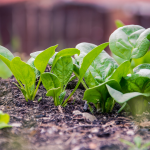If junk science were a competition, the Environmental Working Group’s (EWG) annual reported “Dirty Dozen” would routinely make the finals. As expected, in 2021, EWG has again demonized conventional agriculture practices with their Dirty Dozen list, and there are no shortages of naïve reporters in the media willing to accommodate their nonsense.
agricultural pesticides
In the United States, we live in an affluent culture whose standard of living is high compared to other nations. Yet, we fail to be grateful for the advances in food science and biotechnology we benefit from, which frees us from the day-to-day task of our food production. One of the major phobias consumers struggle with is related to pesticides.
People are terrified of pesticides, which makes places like Whole Foods very happy. But the truth about them actually would terrify the supermarket chain. That's because its produce is loaded with pesticides, made by the plant for protection from predators. So should you worry about the 0.01% of synthetic pesticide residues or the 99.99% of natural pesticides?
A survey by the Pew Research Center, in collaboration with the American Association for the Advancement of Science (AAAS), asked members of the public, on the one hand, and scientists associated with AAAS on the other, about a range of scientific and health issues often in the news.
It is a fairly safe bet that Alex Berezow is going to have a very busy day, and some of it will be rather unpleasant.
Berezow, the founder of the enormously popular RealClearScience website takes no prisoners in his scathing piece a combination of opinion and investigation that Whole Foods (and the rest of the organic food industry) will not be happy to read.
Here are some of the most provocative (and good luck finding any that aren t) quotes and references:
We were rather perturbed to see a piece by Julie Revelant on FoxNews.com this week called 10 Ways to Rid Your Body of Toxic Chemicals.
Today we give a big shoutout to Hank Campbell, whose Science 2.0 blog is one of the most popular sites a wide variety of science and health issues.
Campbells s thought provoking piece, Organic Food Does Not Reduce Cancer Risk will really make you wonder if the organic lifestyle you may be adhering to makes any sense. Campbell s conclusion: No way.
Steve Savage, an expert on agriculture, pesticides and GM foods has posted an intriguing piece on Science 2.0 (the same site on which ACSH s Dr. Josh Bloom now regularly contributes).
Savage has a lot to say. In his piece, entitled Our Farmers Get An A+ For Low Pesticide Residues, he discusses a recent report by the USDA which examined pesticide residues on food.
From the USDA report: "The Pesticide Data Program provides reliable data through rigorous sampling that helps assure consumers that the produce they feed their families is safe."
Year in and year out, agricultural pesticides have been the subject of considerable fear-mongering, leaving the typical consumer with the impression that these chemicals taint much of our food supply and are harmful to human health. In fact, just the opposite is closer to the truth. The published scholarly literature has failed to turn up evidence of adverse human health effects from use of modern pesticides in the real world.
Year in and year out, agricultural pesticides have been the subject of considerable fear-mongering, leaving the typical consumer with the impression that these chemicals taint much of our food supply and are harmful to human health.
In fact, just the opposite is closer to the truth. The published scholarly literature has failed to turn up evidence of adverse human health effects from use of modern pesticides in the real world. Furthermore, in light of the current economic perturbations, as well as the progressive severity of worldwide food shortages and the resulting malnutrition and spiking prices of basic food commodities, the claims that these pesticides pose a threat to human health are false, misleading and dangerously irresponsible.



